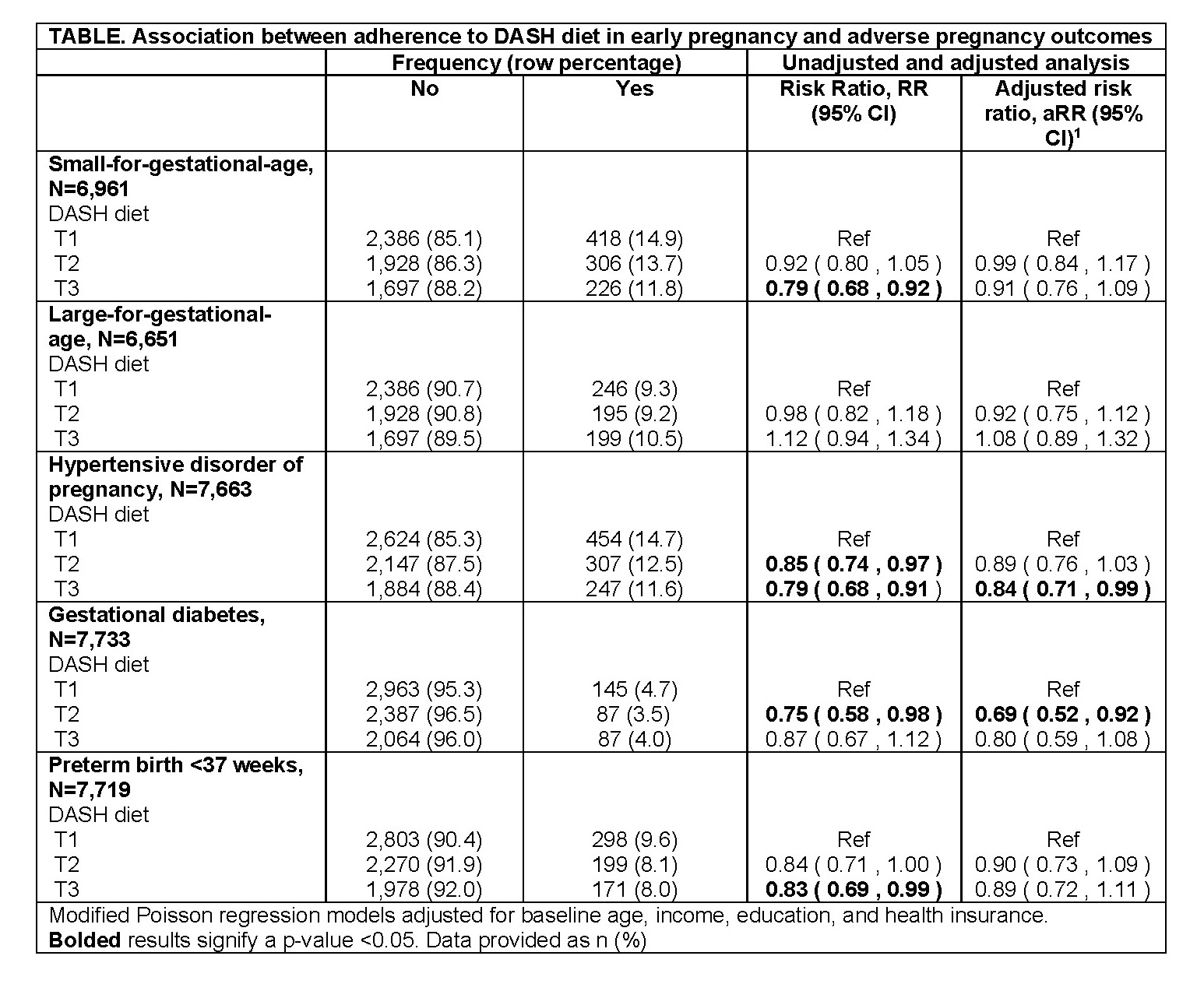Final ID: P1113
Periconceptional DASH Diet and Adverse Pregnancy Outcomes:
Abstract Body: Background: A DASH (Dietary Approaches to Stop Hypertension) diet is associated with improved cardiovascular health (CVH) outcomes in non-pregnant individuals, but its association with CVH-related pregnancy outcomes is not clear. We examined whether a periconceptional DASH diet was associated with adverse pregnancy outcomes (APOs), which are associated with CVH-risk.
Methods: This is a secondary analysis of data from the prospective Nulliparous Pregnancy Outcomes Study-Monitoring Mothers-to-Be (nuMoM2b) cohort. We calculated DASH diet scores from Block food-frequency questionnaires administered in the first trimester. DASH diet scores were categorized in tertiles from Tertile 1 (T1, least adherent) to Tertile 3 (T3, most adherent). APOs were evaluated individually and included small-for-gestational-age neonate [<10th percentile, SGA], large-for-gestational-age [> 90th percentile, LGA]), hypertensive disorder of pregnancy (HDP), gestational diabetes mellitus (GDM), and preterm birth (PTB) <37 weeks. Individuals with hypertension or diabetes prior to pregnancy were excluded. Modified Poisson regression models were adjusted for age, income, education, and health insurance, but not cardiometabolic risk factors deemed to be on the causal pathway (i.e., BMI). Secondarily, we assessed whether the above associations varied by adequate neighborhood food access, determined at the census tract level using the USDA Food Atlas.
Results: Among 7,981 nulliparous individuals with dietary and outcome data, the frequency of SGA, HDP, GDM, and PTB were lower with higher adherence to a DASH diet (p<0.05 for all). In adjusted analyses, nulliparous individuals who reported the highest adherence to a DASH diet (i.e., T3) had a lower risk of developing HDP compared with those who had the least adherence (i.e., T1) (11.6% vs 14.7%; adjusted risk ratio, aRR 0.84, 95% CI 0.71-0.99). Those in T2 compared with the T1 were at lower risk of developing GDM (3.5% vs 4.7%; aRR 0.69, 95% CI 0.52-0.92). Adherence to a DASH diet was not associated with SGA, LGA, or PTB (TABLE). The above associations between a DASH diet and HDP and GDM did not vary by neighborhood food access (interaction p-value=0.82 for HDP; 0.37 for GDM).
Conclusions: DASH diet in early pregnancy was associated with lower risk of developing HDP and GDM in nulliparous individuals. Further interventional research is needed to understand whether promotion of a DASH diet in early pregnancy can reduce the risk of these APOs.
Methods: This is a secondary analysis of data from the prospective Nulliparous Pregnancy Outcomes Study-Monitoring Mothers-to-Be (nuMoM2b) cohort. We calculated DASH diet scores from Block food-frequency questionnaires administered in the first trimester. DASH diet scores were categorized in tertiles from Tertile 1 (T1, least adherent) to Tertile 3 (T3, most adherent). APOs were evaluated individually and included small-for-gestational-age neonate [<10th percentile, SGA], large-for-gestational-age [> 90th percentile, LGA]), hypertensive disorder of pregnancy (HDP), gestational diabetes mellitus (GDM), and preterm birth (PTB) <37 weeks. Individuals with hypertension or diabetes prior to pregnancy were excluded. Modified Poisson regression models were adjusted for age, income, education, and health insurance, but not cardiometabolic risk factors deemed to be on the causal pathway (i.e., BMI). Secondarily, we assessed whether the above associations varied by adequate neighborhood food access, determined at the census tract level using the USDA Food Atlas.
Results: Among 7,981 nulliparous individuals with dietary and outcome data, the frequency of SGA, HDP, GDM, and PTB were lower with higher adherence to a DASH diet (p<0.05 for all). In adjusted analyses, nulliparous individuals who reported the highest adherence to a DASH diet (i.e., T3) had a lower risk of developing HDP compared with those who had the least adherence (i.e., T1) (11.6% vs 14.7%; adjusted risk ratio, aRR 0.84, 95% CI 0.71-0.99). Those in T2 compared with the T1 were at lower risk of developing GDM (3.5% vs 4.7%; aRR 0.69, 95% CI 0.52-0.92). Adherence to a DASH diet was not associated with SGA, LGA, or PTB (TABLE). The above associations between a DASH diet and HDP and GDM did not vary by neighborhood food access (interaction p-value=0.82 for HDP; 0.37 for GDM).
Conclusions: DASH diet in early pregnancy was associated with lower risk of developing HDP and GDM in nulliparous individuals. Further interventional research is needed to understand whether promotion of a DASH diet in early pregnancy can reduce the risk of these APOs.
More abstracts on this topic:
Advanced Lipid Status Parameters in Women With Preeclampsia
Gojkovic Tamara, Saric Matutinovic Marija, Ivanisevic Jasmina, Vladimirov Sandra, Spasojevic Kalimanovska Vesna, Mikovic Zeljko, Stefanovic Aleksandra, Ardalic Daniela, Antonic Tamara, Banjac Gorica, Zeljkovic Aleksandra, Vekic Jelena, Miljkovic Trailovic Milica, Munjas Jelena, Jovicic Snezana
Factors Associated with Food Insecurity in Clinic Populations in Kingston, JamaicaOladele Carol, Boyne Michael, Ferguson Trevor, Desai Mayur, Bennett Nadia, Wambugu Vivien, Facey Keri-an, Lawrence Cavel, Galusha Deron, Cunningham-myrie Colette, Tulloch-reid Marshall, Brewster Marlene

